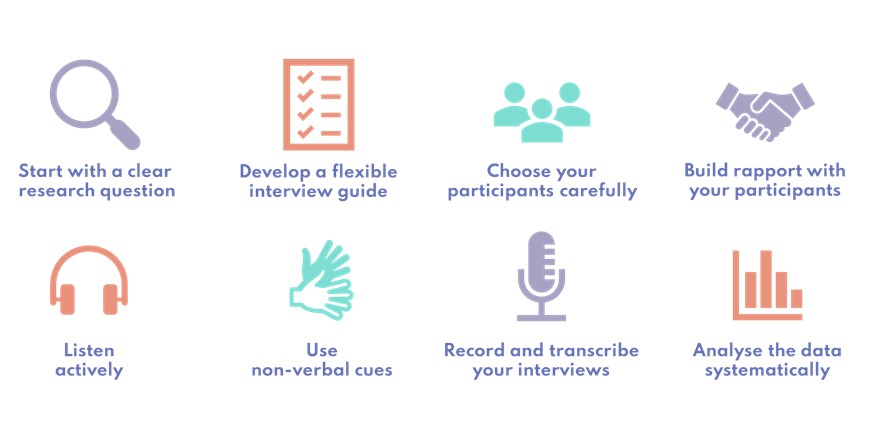Top tips for running a successful qualitative interview
Qualitative interviewing is an important research method used to gain insights and perspectives from individuals about their experiences, opinions, and attitudes. It involves conducting open-ended interviews to collect rich and detailed data that can help researchers understand complex social phenomena. If you are considering conducting qualitative interviews, here are some top tips to keep in mind:

- Start with a clear research question: Before conducting any qualitative interviews, it is essential to have a clear research question or objective. This will guide your interview questions and ensure that you collect relevant data. Your research question should be specific, focused, and grounded in the existing literature.
- Develop a flexible interview guide: Although you should have a general outline of the questions you want to ask, it is essential to be flexible and responsive to your participants’ answers. Your interview guide should be adaptable and open-ended, allowing for follow-up questions and exploration of unexpected topics. Adding prompts will help you dig deeper on important questions.
- Choose your participants carefully: Qualitative interviews involve getting a large amount of rich data from a relatively small sample size, so it is crucial to select the right participants who will be able to provide valuable insights. Consider factors that might be important to your research question such as their expertise, experiences, and potential perspectives.
- Build rapport with your participants: Building rapport and establishing trust with your participants is crucial for getting honest and detailed responses. Start with small talk and try to create a comfortable atmosphere before diving into the interview questions.
- Listen actively: Active listening involves paying close attention to what your participants are saying, asking follow-up questions, and clarifying any confusion. Avoid interrupting or imposing your own opinions during the interview.
- Use non-verbal cues: Non-verbal cues such as leaning in, maintaining eye contact, and smiling can help you establish a connection with your participants and encourage them to open up.
- Record and transcribe your interviews: Recording your interviews is important for capturing all the details and nuances of your participants’ responses. A good quality multichannel digital recorder is worth its weight in gold as it helps achieve the best quality recording even in less than ideal recording spaces with background noise. Having a recorder is recommended even if you are using a digital platform such as Zoom to undertake the interviews as this can serve as your back-up. Take notes during the interview and allow time post-interview to reflect on the interview experience. Transcribing the interviews will help you analyse the data and identify your themes.
- Analyse the data systematically: Once you have collected and transcribed your interviews, it is essential to analyse the data systematically. Best practice involves having a clear theoretical stance and method for doing your analysis. Qualitative research checklists such as the Standards for Reporting Qualitative Research (SRQR) or COnsolidated criteria for REporting Qualitative research (COREQ) are essential to ensure you are reporting all the necessary information in your paper to enable your work to be reproducible and in-line with best practice. Look for patterns and themes in your participants’ responses and your interview notes then use them to develop your findings.
How qualitative interviewing is used in our study
The Bump2Baby and Me study is using qualitative interviewing at several stages to get a deeper understanding of what the trial experience was like for women and their partners, the health coaches and research teams; what wider stakeholders perceive the intervention to be about; and what wider events or changes have potentially impacted the trial. Each of these interview types will help provide the research team with a much fuller understanding of what Bump2Baby and Me achieved and its impact. The Bump2Baby and Me findings from our qualitative data will be mainly released next year (2024) and we are really looking forward to seeing what insights they bring.
In conclusion, qualitative interviewing is a valuable tool for gaining deep insights and understanding complex social phenomena. By following these top tips, you can ensure that your interviews are productive and insightful, and the data you collect are reliable and relevant to your research question.
